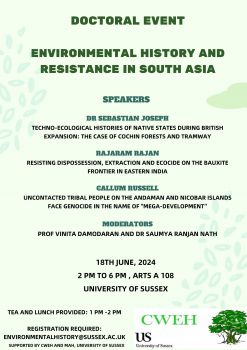Environmental History and Resistance in South Asia
Tuesday 18 June 14:00 until 18:00
University of Sussex Campus : Arts A108 and Zoom (link will be shared after registration)
Speaker: Dr Sebastian Joseph, Mr. Rajaram Rajan, Mr. Callum Russell

Registration is required for the event. Please write to environmentalhistory@sussex.ac.uk to book a place (either online or in-person).
Schedule:
1-2pm: Tea and Lunch provided
2-3.15pm: Techno-Ecological Histories of Native States during British Expansion: The Case of Cochin Forests and Tramway by Dr Sebastian Joseph, Assistant Professor, Department of History, UC College, Aluva, Kerala
Brief about the topic
This lecture will explore the intricate relationship between technological advancements and ecological transformations in Cochin, a princely state in southwestern India, highlighting how these developments were influenced by and contributed to the British colonial enterprise.
The Cochin tramway, established in the early 20th century, serves as a fascinating case study of colonial technological intervention in native states. This system not only facilitated the extraction and transportation of forest resources but also significantly altered the ecological landscape and local socio-economic dynamics. By examining this history, we can gain deeper insights into the interplay between colonial power, indigenous agency, and environmental change.
Moderator/Chair for the session : Prof Vinita Damodaran
3.30-6pm: Footnotes on Ecocide and Resistance from India’s Bauxite Frontiers by Rajaram Rajan and Callum Russell
Rajan is a non-indigenous freelance journalist from India who has been reporting on anti-mining movements & forced evictions from Protected Areas. He has also been campaigning against the policy of boarding schools for Indigenous children in India.
Callum Russell is Asia Research and Advocacy Officer at Survival International and help to coordinate Survival's uncontacted tribes’ cases in Asia.
Brief about the topic
Indigenous peoples/Mulniwasis (original peoples) across the world have often articulated a pluralist more-than-human vision of the world where forests, hills, animals and humans are equals. These communities have always treated land and all its bio-geo-cultural lifeforms as sacred and defended it against the onslaught of industrial modernity and its universal war machine called development.
In this conversation, we wish to discuss and share with you how this vision of the forest-dwelling indigenous peoples is being systemically undermined under the brute force of the Indian state along with the nexus of mining corporations, military, NGOs and educational institutions. We bring to you stories of communities who have been at the forefront of major battles resisting dispossession, extraction and ecocide on the bauxite frontier of Odisha as well as the deep interlinkages that mining cartels share with schooling industries and wildlife conservation across indigenous territories.
Callum Russell speaks about Uncontacted tribal people on Indian island face genocide in the name of "mega-development". The Shompen are a largely uncontacted tribe on Great Nicobar Island in India. They now face genocide through a “mega-development” project to transform their small island into the “Hong Kong of India”.
Moderator/Chair for the session: Dr. Saumya Ranjan Nath
Posted on behalf of: School of Media, Arts and Humanities
Last updated: Friday, 14 June 2024


